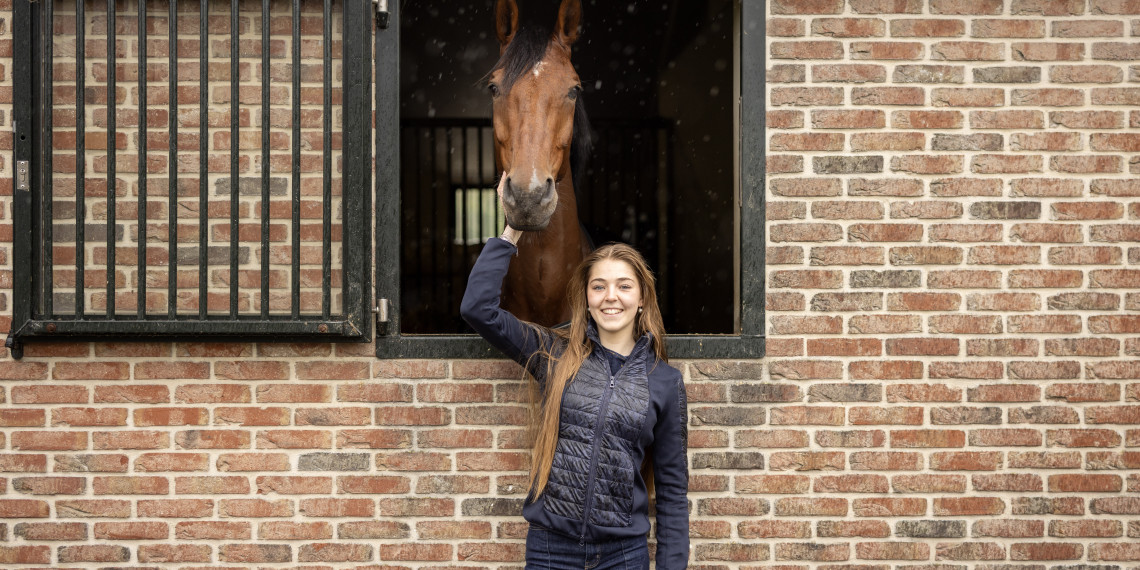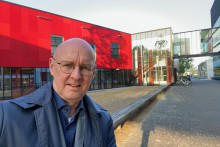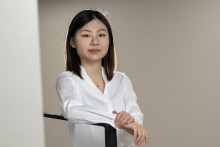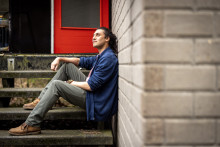Three-part series: the UT students
U-Today had conversations with three UT students about their studies, student days, their dreams, hopes and ambitions. This provided a wonderful insight into their views on life. In the second part of this three-part series: Sophie Weening.
'Shall I pick you up from the station?
'Yes, please! Not on horseback, I hope?'
'Aww too bad, then I'll bring a different kind of horsepower.'
With a wide grin Sophie Weening looks out of the window of a large all-terrain vehicle in front of Raalte station. Ten minutes later, she routinely pulls into her parents' yard. In the meadow, four horses stand glowing in the spring sun. In rubber boots, she leads the way past the high stables to the house.
Weening is a second-year bachelor's student of international business administration and lives with nine others in a student house in the heart of Enschede. She enjoys getting groceries and doing her own laundry, and to be able to study undisturbedly in her room, she chuckles, while looking at her twin brothers of almost eighteen, who come into the kitchen hungry, looking for lunch. But even though she has been out of the house for almost a year and a half, her old teenage room is still as it was. Six days a week, she is at home with her parents during the day, to take care of and train her horses. In July 2023, just before she participated in the Kick-In in Twente, she became the Dutch champion of 'eventing', the all-around discipline in equestrian sports.
The sport costs Weening about thirty to forty hours a week, especially during the competition season, which runs from March to October. 'If it's exam week during that period and I have a lot of social things, it can be a lot. But I like to be busy. It offers structure, and it gives me energy.'
What do your days usually look like?
'That differs, depending on how busy I am at university. Most lectures are non-compulsory, I often go to the first lectures of a module to see if it is useful and then I drop out a bit. In the morning I usually attend lectures and in the afternoon I ride. In the evening, I often go back to Enschede for a house evening, a year club evening, or an activity with Bastet, my fraternity.'
In between lectures, Weening can often be found in the gym. 'I mainly train my legs and my abs. In dressage, you must sit as still as possible on your horse while everything is rocking, and that stability comes from your pelvis and belly. In a cross, you are constantly in a kind of squat position above your horse while you absorb the shocks of the jumps.' With a laugh: 'Sometimes I come off my horse shaking.'
Her love for horses started at the age of four, during a pony ride on holiday. 'After a few lessons at the riding school, my instructor said: maybe it would be nice to buy her a pony, because she has a talent for it.' She soon opted for eventing, a dynamic combination of dressage, a jumping course, and a cross - in other words: galloping through forests and meadows as fast as possible, racing through water features, and jumping over tree trunks along the way. 'I love that adrenaline rush. Around the age of ten I had a lot of headaches, but as soon as I rode a horse, they went away. Nowadays, I just like to be outside in between studying, and to clear my head.' Drily: 'But most of the time I'm just shovelling manure outside in bad weather, haha.'
Fortunately, she is not alone. 'When I was in primary school, my mother had a practice in remedial teaching, but she gave it up. Now mom does a lot for me in the stables and on the grounds. I like the fact that when I come home, there is always someone to take care of me.'
What is the atmosphere like in the professional equestrian world?
'The season always starts pleasantly, everyone helps each other. But in the run-up to a championship, you notice that it still is an individual, competitive sport. Everyone hopes to make the best of it themselves, and sometimes I get the idea that people like it better when things are not going so well for others. Cliques form, everyone keeps an eye on each other and peeks at each other. That can impact the fun.'
My pony took off, and I hung under it while he jumped over the obstacle
In 2021, when she is sixteen, she is experiencing both her most miserable and most glorious moment in the sport. 'I rode my first European Championship. But there were many problems beforehand. We thought that with Hip Hop we were buying an experienced pony, but he turned out to be insecure. Jumping was not really possible. At one point, I had an accident with that pony, after which I didn't dare to ride it anymore.'
You fell off at full speed?
'He froze. I fell off, but one foot got stuck in the stirrup. My pony took off, and I hung under it while he jumped over the obstacle. Fortunately, at one point my boot came off, then I fell off. My cap was broken in half, but otherwise, it didn't hurt me seriously, except for a trauma and a trip to the hospital. After that, I found riding very scary. My father took me to Limburg every weekend for a winter to train with the national coach. Three quarters of a year after completing all those training sessions, I won a bronze medal at the European Championships.'
Your studies prepare you for the business world. As a rider, can you practice your leadership skills?
'Certainly, you have to get a feel for your horse, see what works. In dressage, you ride figures in a cordoned off lane. Some riders find that boring, but enjoy training that. The point of dressage is showing that you have your horse under control. It has to be very beautiful and chic, it's all about appearance.'
Text continues below the picture.

'Most top athletes have parents who also ride and help with horse training. I didn't grow up in a horse-minded family, I have to train my horses myself. In a way, I like that: I had to learn to do everything myself, otherwise my horse would not progress. And if your horse is not in shape, you can have so much talent, but then you won't get anywhere.'
As a top athlete, you are never satisfied.
'There is always room for improvement. I had to teach myself discipline at a young age, because in secondary school I already had four ponies. I had to plan in a very structured way to get everything done.'
Does that mentality now also extend to your studies?
'It’s in my nature to put quite a bit of pressure on myself. I want to pass all my exams in one go, but I think I'm more of a perfectionist in horse riding than in my studies. I am satisfied with a 6.5 or a seven. Of course I prefer higher grades, but then I would have to invest a lot more time, and I don't have that time. As long as I have my credits, I’m happy. I'm not going to resit sixes.'
Weening actually had no intention of studying international business administration at all. 'From an early age, I wanted to study veterinary medicine, so I opted for the exact curriculum at gymnasium. I did not make that year’s selection for Utrecht University, but I soon made my peace with that. As a veterinarian, you must be available day and night, which is not ideal in combination with the sport. I always had a knack for economics. My father studied technical business administration in Enschede, he worked as a consultant for years and is now director of a company in circular animal food. He often talks about it, and I find it interesting. I thought: business administration would allow me to explore many directions without having to know exactly yet what I want to do later, so I can gradually discover what fascinates me. I was admitted to Maastricht University, but I couldn't find a room there. Then my grandfather said: why don't you enrol for International Business Administration in Enschede?'
You are now in your second year, what do you find interesting about your studies?
'I like the fact that we get to see many different aspects of business operations, such as finance and supply chain. But I think it's a shame that the education is quite superficial. We mainly study theoretical models. Then they say, for example: oh yes, digitisation is important. But they do not say how or what, they do not discuss current developments. I also miss the financial insight, the calculations. I want to opt for a finance module again, because I really liked those numbers last year.'
Do you see any more room for improvement?
'There are certainly professors with whom I think: say, is it okay, can't it be done differently? Some teachers are not good at explaining, or speak poor English. As a result, you spend the whole lesson back-translating everything, and only then can you store the information in your head.'
In September, Weening will leave for the University of Angers for a minor for six months, to gain international experience. She will take her horses with her, to train with an Olympic rider, in addition to her studies. In 2028, she could theoretically - fingers crossed - compete in the Olympic Games, although she does not want to get ahead of herself out loud. With a knowing look: 'But I hope that this training can open up some paths.'
Yet, she does not dream of a career as a top athlete. Resolutely: 'I consciously chose my studies, because I don't know if I want to make a career out of horse riding. A top sports career means much of the same, and it is a struggle to earn a living in equestrian sports. I wonder how much fun it is when you have to do matches in a row. I think it would be more fun to keep the horses as a professional hobby.'
Text continues below the picture.

The choice for a student house was also well-considered. 'I love my social life, and I was afraid that otherwise, I would be with my parents all the time and put all my time into horse riding. I didn't want to sit in a room somewhere on my own, I love to chat. Every other week, there is a house evening and we often eat together or watch a movie. Student life brings a lot of fun, that's why I wanted to join a student association. You immediately get to know a lot of people. Every week, we have an evening with girls from different study years, and my year club is full of my type of girls.'
What is your type?
'Girls who are more likely to look for fun in hanging out together, chatting, and doing activities, instead of having to be the first in the pub and drinking beer.'
Does heavy drinking trouble you?
'Oh no, it doesn't bother me when others drink a lot, but I train every day, I can't be drunk while on horseback. In the winter break, I can go on a bender once in a while, but two weeks before a match I drink absolutely nothing and I go to sleep on time. I can't just say: tomorrow I'll sleep in. I simply have living animals that need to be trained and cared for.'
Do you feel a difference in mentality between you and your fellow students?
'Yes, I live quite seriously and in a structured way. Sometimes that conflicts with student life. I don't have time for some activities, I sometimes get comments about that. Then I think: Sorry, but then you don't quite understand how it is. If I'm with my parents all day, I get up early, I feed the horses, I take them outside, I muck out the stable, and I train. By the time I'm done, it's nine o'clock in the evening and I still have to study.'
What do you want to do after your bachelor's degree?
'If I stay in Enschede, I would like a master's degree in Industrial Engineering and Management. This is mainly about solving problems within international organisations and improving performance with the help of simulations, mathematical, and statistical models. Ideally, I would like to follow a pre-master's, to see if it is really something for me. I don't know yet what I want to do after my studies. It also depends a bit on what will happen around the Olympic Games in 2028, and how fanatically I will continue to ride.'
Traditionally, student life is seen as a period of ultimate freedom, but in 2025 there is a threat of war, housing shortage, and climate crisis. To what extent do these issues play a role in your life?
'I can worry about some developments. What will the climate look like in the future? What is going on with America now, the threat of war, what influence will that have here? I wonder what consequences that could have for my studies, or for what I can do afterwards. My father says: conscription will soon return. Then I think: ‘Oh my god, would that also apply to me?’'
Demonstrations are becoming more and more common on campus, for example by Extinction Rebellion, and by students who draw attention to the situation in Gaza. Are these also topics of conversation in your student house?
'Everyone agrees that the climate is important. Two fraternity members are members of the Student Union and often talk about their sustainability projects. A roommate of mine is chairman of the Business Days Twente, which were held in February. Extinction Rebellion then blocked the entrances to the Grolsch Veste, because companies such as Shell participated. My roommate said: ‘We sat down with XR beforehand about how we could lead things in the right direction, and we indicated that the company fair was meant for students, not for encouraging a company and their pollution. And then they still blocked the entrances, and students couldn’t get in!'
'I do talk about Gaza with my parents, but those are more informative conversations, in which I try to understand who does what and how it is connected. We don't have moral discussions about it. I think it is important to know what is going on, without always having to have your opinion ready right away. I'm also someone who can say to myself: ‘Okay, you can't do anything about this right now. So follow the news, because it is important, but don't make it hold you back, and focus on your own things.’ By that I don't mean: I wash my hands of it, that would sound easy and lax. But I have plenty of other things in my life that I have influence on and which are more important to me. I am now in the second year of my studies, adult life is still a while away. If I have any worries, it's more about whether I have everything under control here with the horses, and whether I pass my studies, instead of worrying about all the intricacies of Dutch politics.'
How optimistic are you about the future?
'I'm quite optimistic, but I do worry about the tightness in the housing market. Sometimes I think: will I be able to do it all later? Am I going to find work, where am I going to end up? Many students are now uncertain about this. I hear from many people who have finished studying and have difficulty finding a home. I sometimes think, ‘Darn it, I’ll graduate soon., What do I want then, and what can I actually do? If I start working, do I have to go back to my parents first? But those are questions that I don't have an answer to now. I'm a bit in my own world here with my horses, and my student life in Enschede is still a kind of safe bubble.'
What have you taken away from your time at UT so far?
'Twente has brought me a lot, especially on a social level. I was always a bit shy. In group projects in secondary school, I was usually the one who kept my mouth shut and went to work. I have become more open, I talk to people more easily. Student life teaches me to stand up for myself and stand my ground, even when it comes to setting my boundaries in small things: activities that I do or don't want to be part of. Whether I want to drink alcohol or not. Whether or not I want someone to come into my room when I still have to study. Up to saying during a project: ‘Okay guys, I've done my bit, now I want you to do something too.’ I can get very annoyed when people are lax, because I always want to have everything neatly organised'.
'When I started my studies, I thought I was supposed to participate in everything, because I thought that otherwise, people wouldn't like me so much, or that I wouldn't be part of the group anymore. Now I prefer to spend my time with handful of people with whom I can go for a walk at the weekend or with whom I can have a nice conversation, even when things aren’t so well for a minute. At university, I discovered what I really value.'

Photo credits: Rikkert Harink







